|
Listed by department. See
other faculty achievements in
Top
Stories.
BIOMEDICAL SCIENCES
Associate Professor Michelle
Arbeitman, Ph.D., had her paper “Somatic sex-specific transcriptome
differences in Drosophila revealed by whole transcriptome sequencing”
published by BMC Genomics. The website also proclaimed it a “most
viewed paper.”
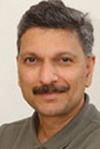
Professor
Pradeep Bhide (pictured here), Ph.D., and Research Associate
Deirdre McCarthy had a paper published in the Sept. 21 issue of
The Journal of Neuroscience. Using a mouse model, the paper – “Cocaine
Alters BDNF Expression and Neuronal Migration in the Embryotic Mouse
Forebrain” – reported new findings on how cocaine abuse during pregnancy can
alter development of the brain of the unborn fetus.
Professor
Michael Blaber, Ph.D., and Professional Research Assistant
Sachiko Blaber had a paper published by Bioorganic &
Medicinal Chemistry Letters. The title was “Biological evaluation and
docking studies of natural isocoumarins as inhibitors for human kallikrein 5
and 7.” Also, Michael Blaber’s paper “Substrate specificity of kallikrein-related
peptidase 13 activated by salts of glycosaminoglycans and a search for
natural substrate candidates” was published by Biochimie. Sachiko Blaber
also contributed.
The lab of Professor Myra Hurt,
Ph.D., studies the regulation of gene expression patterns controlling human
cellular growth and proliferation. In particular, it works toward
elucidation of cellular pathways altered in proliferative diseases, such as
cancer. Mitosis is the culminating step of the cycle where, after growth,
one cell divides into two. Many gene expression regulators are inactivated
during mitosis. The lab recently uncovered a mechanism for the simultaneous
and coordinated regulation of hundreds of gene expression regulators, called
C2H2 zinc finger proteins, during mitosis. A mechanism of such global nature
has never been demonstrated before. This novel finding was published in the
Oct. 1 issue of Cell Cycle journal. The article, “Global mitotic
phosphorylation of C2H2 zinc finger protein linker
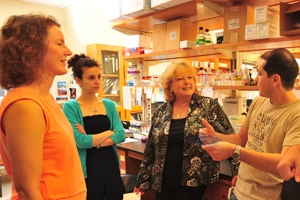 peptides,”
was co-written by Hurt (who is second from right in this photo), research
coordinator Beth Alexander (far left) and
postdoctoral fellow Raed Rizkallah (far right). peptides,”
was co-written by Hurt (who is second from right in this photo), research
coordinator Beth Alexander (far left) and
postdoctoral fellow Raed Rizkallah (far right).
As commentaries
on the findings reported in the aforementioned paper, Cell Cycle has invited
two “News&Views” articles to be published: “Phosphorylation during mitosis:
How many kinases are out there?” (November) and “Coordinate inactivation of
zinc finger transcription factors at mitosis” (December). Ongoing research
in their laboratory aims at exploring the differential regulation of this
new mechanism in tumor cells.
In addition, a
critical tool that has enabled this study was the generation of a new
antibody that can specifically identify mitotic – and thus proliferating –
cells. This antibody offers great potential as a proliferation biomarker to
be used by cell cycle and cancer researchers around the world. To protect
this new invention, a patent application was recently filed by the Office of
Intellectual Property at FSU. The Hurt lab is in the process of licensing the
production of the new antibody to Millipore Co. to make it commercially
available to the research community.
Associate Professor
James Olcese, Ph.D., had “Circadian aspects of mammalian
parturition” accepted for publication in Molecular and Cellular
Endocrinology. In August, he also presented a poster, “Neuroprotective
actions of melatonin in the Alzheimer brain,” at the XII European Biological
Rhythms Society conference in Oxford.
The lab of Associate Professor
Branko Stefanovic, Ph.D., had a paper published in Current
Medicinal Chemistry. The paper, “Progress Towards Discovery of Antifibrotic
Drugs Targeting Synthesis of Type I Collagen,” was written by Branko
Stefanovic, Lela Stefanovic and Biomedical Sciences alumni
Dillon Fritz and Le Cai.
CLINICAL SCIENCES
Professor Gerry Maitland,
M.D., was featured speaker at these events:
O “Multiple sclerosis: New
treatments.” FSU/TMH Research Center. Dothan, Ala., June.
O “Living with
multiple sclerosis,” Pfizer, Tallahassee, June.
O “Errors of commission
and omission in the evaluation of the falling patient,” national webcast
sponsored by Senior Falls coalition of Florida, September.
O “Pedaling
for advances in clinical research in Parkinsonism,” College of Medicine.
Tallahassee, September.
He also made a presentation at The Movement
Disorders Society 15th International Congress of Parkinson ’s Disease and
Movement Disorders in Toronto during June. The presentation was “Low
contrast visual acuity is decreased in patients with parkinsonism,” with
research by Maitland, Class of 2012 students Coley Sheriff
and Sarah Novara and Class of 2014 student Jessica
Specht.
Assistant Professor L. Kristin
Parsley, M.D., had two papers published recently:
O “Identical
Twin Sisters with Rubinstein Taybi Syndrome associated with Chiari
Malformations and Syrinx,” American Journal of Medical Genetics, July.
O
“The Patient with Infantile Seizures,” Current Opinion in Pediatrics,
October. The article focuses on a systematic and tiered approach to infants
presenting with recurrent seizures.
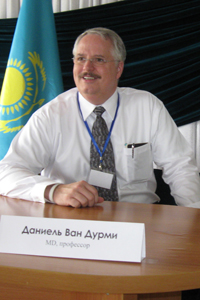
FAMILY MEDICINE &
RURAL HEALTH
Department Chair
Daniel Van Durme, M.D. (pictured here), director of the College of
Medicine’s Center on Global Health, worked with faculty from UCLA, USF and
VCU in teaching a weeklong course on research methods, grants and medical
writing for faculty from several medical institutes and medical schools in
Karaganda, Kazakhstan.
Director of Rural Health
Maggie Blackburn,
M.D., and Professor Gail Bellamy, Ph.D., received a
Community Health Center Planning Grant awarded by the Health Resources
Services Administration Bureau of Primary Health Care. The total award is
$80,000. The grant will be used to underwrite assessment and planning
activities for the Havana Wellness Center to apply to become a federally
qualified health center.
This
photo of Bellamy, on vacation in Tanzania,
illustrated an article in the Summer 2011 issue of Rural Roads, the
magazine of the National Rural Health Association.
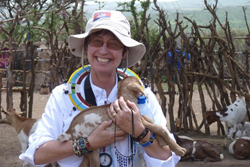 The article, “Rural
Healthy People project creates objectives for healthy communities,”
discussed the work being done by Bellamy and a colleague at Texas A&M to
adapt the federal Healthy People 2020 standards to meet rural priorities.
Bellamy is director of the Center for Rural Health Research and Policy at
the College of Medicine. The article, “Rural
Healthy People project creates objectives for healthy communities,”
discussed the work being done by Bellamy and a colleague at Texas A&M to
adapt the federal Healthy People 2020 standards to meet rural priorities.
Bellamy is director of the Center for Rural Health Research and Policy at
the College of Medicine.
Bellamy was re-elected
chair of the Editorial Board of the Journal of Rural Health. Also, at the
close of this year’s annual meeting of the American Public Health
Association, she will become chair of the Intersectional Council (ISC),
representing the 26+ membership sections and Special Interest Groups (SPIGs)
that make up the association. As chair of the ISC, she will also be an
ex-officio member of the board of directors. Also, Bellamy
was an invited speaker at the 6th Annual Educational Forum on Diabetes
Prevention and Management: Reaching Diverse and Underserved Populations. Her
presentation was “The Importance of Health Literacy in Prevention and
Self-Management of Diabetes.”
Associate Professor Kendall
Campbell, M.D., was one of the participants in Tallahassee’s Take a
Loved One to the Doctor Day. The Sept. 30 event at Neighborhood Health
Services – coordinated locally by the
Leon County Health Department, the state Office of Minority
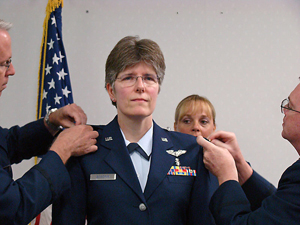 Health and
Walgreens Pharmacy – included a press conference, free health screenings and
access to health information and resources. It was designed to improve the
health of racial and ethnic minority populations. Health and
Walgreens Pharmacy – included a press conference, free health screenings and
access to health information and resources. It was designed to improve the
health of racial and ethnic minority populations.
Assistant Professor
Meredith Goodwin, M.D., was promoted to colonel in the U.S.
Air Force Reserve in September. Col. (Dr.) Goodwin is the chief of aerospace
medicine for the 919th Special Operations Wing Medical Squadron. She got her
eagles pinned on Sept. 11 at Duke Field, Fla.
GERIATRICS
Department
Chair Ken Brummel-Smith, M.D., Senior Associate Dean
Alma Littles, M.D., and third-year student Andy
Hogan were featured in “Patient Science” in the September issue of
The New Physician, published by the American Medical Student
Association. It also included photos of Associate Family Medicine Chair
Curtis Stine and College of Medicine students with older
patients. Here are excerpts:
O “Dr. Ken Brummel-Smith … says the early
exposure to relatively healthy older patients helped students develop
positive attitudes toward this growing age group and meant they were better
equipped to deal with more complicated cases by their fourth year.”
O “Dr. Alma
Littles … says students need to learn enough about their patients to be able
to communicate clearly about their course of treatment.... ‘If you’re not able to
communicate with a patient at a level and in a language they can understand,
it doesn’t matter how great the care you’re trying to deliver to them is, it
may not actually get there,’ says Littles. ‘The greatest advice will just be
a flop because it’s not making sense to a patient.’
O “Andrew Hogan ...
sees the importance of both an expansive knowledge of medicine and the
ability to communicate. ‘You can have a great doctor who is not a people
person whose patients are not going to want to listen,’ says Hogan. ‘You
have to make [patients] feel like you are there for them, and they’re not
just writing a check and getting a diagnosis.’”
Brummel-Smith
also was recommended by the Council of Medical School Deans to represent
Florida’s medical schools on the Technical Advisory Workgroup for the Long
Term Care Managed Care implementation. He was appointed by the secretary of
the Agency for Health Care Administration (AHCA) to serve.
Brummel-Smith was selected by peers – for the 13th time – as one of
the “Best Doctors in America.”
Professor Alice Pomidor,
M.D., MPH, gave a brief presentation about falls Sept. 23 as part of this
year’s edition of “Senior Falls Prevention for Health Care Professionals,”
a live WFSU-TV program.
MEDICAL HUMANITIES & SOCIAL
SCIENCES
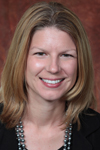 Assistant Professor
Kim Driscoll,
Ph.D., was author or co-author of the following articles either published or
in process: Assistant Professor
Kim Driscoll,
Ph.D., was author or co-author of the following articles either published or
in process:
O “Supporting CF disease management during adolescence: The
role of family and friends,” Child: Care, Health and Development.
O “Does
Blood Glucose Monitoring Increase Prior to Clinic Visits in Children with
Type 1 Diabetes?” Diabetes Care.
O “Use of a Precious Resource: Parental
Decision Making and Experiences Associated with a Trial to Interdict Type 1
Diabetes Using Autologous Umbilical Cord Blood,” Contemporary Clinical
Trials.
O “Screening for symptoms of depression and anxiety in
adolescents and young adults with cystic fibrosis,” Pediatric Pulmonology.
At the 71st Scientific Sessions of the American Diabetes Association
in San Diego, Driscoll also presented a poster based on
this abstract: “White coat adherence in children and adolescents with type 1
diabetes,” Diabetes.
Associate Professor Heather Flynn,
Ph.D., has received several grants recently:
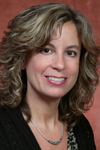 O “Targeted Research on
Mental Health Disparities,” an R01 grant from the National Institute of
Mental Health; she is principal investigator. The aim is to examine
disparities in depression and treatment use from pregnancy through
postpartum across national sites, including the University of Iowa, Emory
University, University of Cincinnati, University of Washington, and Brown
University. O “Targeted Research on
Mental Health Disparities,” an R01 grant from the National Institute of
Mental Health; she is principal investigator. The aim is to examine
disparities in depression and treatment use from pregnancy through
postpartum across national sites, including the University of Iowa, Emory
University, University of Cincinnati, University of Washington, and Brown
University.
O “Predictors of Response to Perinatal Depression Treatment:
Establishing Processes and Infrastructure for Multisite Effectiveness
Research,” an R03 award from the Agency for Healthcare Research and Quality.
She intends to establish the feasibility of transforming clinical databases
into clinical research registries for higher-impact clinical research on perinatal depression.
O “A National Survey of Practice Patterns in
Managing Perinatal Depression,” an internal Georgia Health Sciences
University (GHSU) grant, in collaboration with Dr. Christie Palladino at
GHSU. The project proposes to describe obstetrician-gynecologists’ practice
patterns in managing depression during pregnancy and the postpartum period.
O “Preventing Prenatal Depression in Vulnerable Women,” a Community
Engagement Grant from the University of Michigan Center for Translational
Science, to strengthen research collaboration with Healthy Start Healthy
Families in Oakland County, Mich.
Flynn also was
recently appointed international chair of the Professional Development
Committee within the Motivational Interviewing Network of Trainers. The
committee will develop guidelines and standards for training in motivational
interviewing, an evidence-based approach to health behavior change used
around the globe.
AUTISM INSTITUTE
 Associate
in Medicine Lindee Morgan received a two-year grant of
approximately $114,000 from Autism Speaks. This is an excerpt from her lay
abstract: “The Interview Skills Curriculum (ISC) is an intervention protocol
that teaches adults with ASD [autism spectrum disorder] a variety of social
skills that are generally used within the context of a job interview. The
objectives of this project are 1) to refine and test measures for the ISC
manual; 2) to complete an intervention study to evaluate the feasibility of
an ISC program; and 3) to develop a full Manual of Procedures (MOP) to
prepare for a subsequent larger study to be conducted at multiple sites.”
Morgan’s was one of 10 new research grants totaling almost $1.8 million in
funding over the next three years. Associate
in Medicine Lindee Morgan received a two-year grant of
approximately $114,000 from Autism Speaks. This is an excerpt from her lay
abstract: “The Interview Skills Curriculum (ISC) is an intervention protocol
that teaches adults with ASD [autism spectrum disorder] a variety of social
skills that are generally used within the context of a job interview. The
objectives of this project are 1) to refine and test measures for the ISC
manual; 2) to complete an intervention study to evaluate the feasibility of
an ISC program; and 3) to develop a full Manual of Procedures (MOP) to
prepare for a subsequent larger study to be conducted at multiple sites.”
Morgan’s was one of 10 new research grants totaling almost $1.8 million in
funding over the next three years.
CENTER FOR INNOVATIVE
COLLABORATION IN MEDICINE & LAW
Director Marshall Kapp,
J.D., MPH, had two articles published recently:
O “Conscripted Physician
Services and the Public’s Health,” Journal of Law, Medicine & Ethics
(included in Symposium issue on “Public Health Reform: Patient Protection
and Affordable Care Act Implications for the Public’s Health”).
O “What
Do Medical Students Think About the Law? Report of a Focus Group,”
co-authored by Dennis Baker and Greg Turner
in the Office of Faculty Development, Legal Medicine Perspectives,
a publication of the American College of Legal Medicine.
Kapp
also participated in a panel, “Beyond Advance Directives: Implementing the
POLST (Physician Orders for Life-Sustaining Treatment) Paradigm in Florida,”
at the Florida Conference on Aging sponsored by the Florida Council on
Aging, in St. Pete Beach. Geriatrics Chair Ken Brummel-Smith also
participated. In addition, Kapp presented “A Legal Approach to the Use of
Human Biological Materials for Research Purposes” at an Omaha conference
sponsored by the Creighton University Center for Health Policy and Ethics.
DIVISION OF HEALTH
AFFAIRS
Associate Dean for Health Affairs Les Beitsch,
M.D., J.D., was author or co-author of several recent papers published or
accepted:
O “Quality Improvement and Accreditation Readiness in State
Public Health Agencies,” Journal of Public Health Management Practice.
O
“Public Health Department Accreditation: Setting the Research Agenda,”
American Journal of Preventive Medicine.
O “Why Don Berwick Is Almost
Right: How Public Health Quality Improvement Operates Within Complex
Systems,” Journal of Public Health Management Practice.
O “Legal
Frameworks Supporting Public Health Department Accreditation: Lessons
Learned from Ten States,” Journal of Public Health Management Practice.
O
“Responsibilities of State Public Health Agencies,” American Journal of
Public Health.
Beitsch also is completing service on an Institute of
Medicine committee that lasted for two years and issued three reports,
including “For the Public’s Health: Revitalizing Law and Policy to Meet New
Challenges,” Committee on Public Health Strategies to Improve Health.
FORT PIERCE REGIONAL CAMPUS
Clerkship faculty member
Stephen Badolato, M.D., was named to receive the 2011 Harold S.
Strasser, MD Florida Medical Association Good Samaritan Award. An article in
the October issue of Spacecoast Medicine magazine began: “Physician,
missionary and philanthropist, Dr. Stephen Badolato is a true ‘Renaissance
doc’ whose leadership, generosity and compassion has made a difference in
lives around the world.” The article spoke of his work in Haiti
before and after the earthquake, as well as in Nicaragua. It quoted Barbara
Walker, director of Ruuska Village Hospital in Haiti: “Anytime that I have asked him for help for me or the people of
Haiti, he is always ready and willing to do whatever is needed, always free
of charge and always with the utmost skill and respect.”
Clerkship
faculty member Frank Conidi, D.O., was appointed a
consultant to the FDA’s Neurological Devices Panel and Medical Advisory
Committee, and to the Center for Devices and Radiological Health;
participated as an expert moderator for the FDA’s Sports Concussion
Neurodiagnostic Device workshop in Washington, D.C.; presented “The
Management of Headache in Concussed Athletes,” a poster and lecture, at the
International Headache Society Meeting in Berlin; and presented a lecture at
the American Academy of Neurology’s annual meeting in Hawaii,
titled “Sports-Related Concussion: State of the Art Application of the
Current Fund of Knowledge to Clinical Questions in the Management of the
Athlete.”
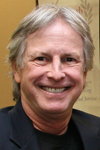 Clerkship faculty member Rene Loyola,
M.D. (pictured here), went on a weeklong surgical mission to Nicaragua with Light of the
World Charities and will be going back in January. Also, he went to
Washington, D.C., with Honor Flights as medical personnel, ferrying World
War II vets to see the monuments. Clerkship faculty member Rene Loyola,
M.D. (pictured here), went on a weeklong surgical mission to Nicaragua with Light of the
World Charities and will be going back in January. Also, he went to
Washington, D.C., with Honor Flights as medical personnel, ferrying World
War II vets to see the monuments.
Clerkship faculty member
John Peden, M.D., was recently recognized by the American
Orthopaedic Society for Sports Medicine as an active member, which requires
the physician to demonstrate a significant contribution and commitment to
sports medicine as it relates to his practice, including research and
publication, service as a team physician, and education of those providing
health care to athletes. Peden also is a member of the Arthroscopy
Association of North America, and this year he was elected to the
Communications Committee, then appointed to the Communities of Practice
Committee, which is responsible for the continuing development of an online
forum for association members to share and discuss techniques, procedures,
knowledge and experience.
Peden has participated for
several years as an Associate Master Instructor teaching arthroscopic
cadaveric laboratory courses at the Orthopaedic Learning Center in Chicago,
but this will be his first year acting as a Support Faculty Member for
Arthroscopy Association of North America's annual Fall Course, held this
year Nov. 17-19 in Palm Desert, Calif.
ORLANDO REGIONAL
CAMPUS
Clerkship faculty member Sarfraz Ahmad,
Ph.D., has had numerous peer-reviewed publications and presentations,
including:
O “Therapeutic roles of heparin anticoagulants in cancer and
related disorders,” Medicinal Chemistry.
O “Impact of environmental
factors on thromboembolic disorders,” co-author of chapter in Environmental
Pollution: Ecology and Human Health, Narosa Publishing House, New Delhi.
O “Functional consequences of cellular interactions with heparin-PF4
antibodies in heparin-induced thrombocytopenia,” oral presentation at the
44th Middle East Medical Assembly (MEMA) Conference, organized by The
American University of Beirut in Joint Sponsorship with Cleveland Clinic.
O “Chemistry and pharmacology of heparin anticoagulants and its
therapeutic applications and limitations: An update,” peer-reviewed
abstract, Proceedings of the International Conference on Chemistry:
Frontiers and Challenges, in press.
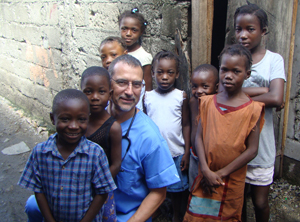 Clerkship faculty member
Thomas A. Lacy, M.D., has been working with
Helping Babies Breathe,
a program developed by the American Academy of Pediatrics (AAP) to teach
newborn resuscitation to local birth attendants in resource-limited
countries. After becoming a mentor trainer
for the AAP, in June he did a pilot Helping Babies Breathe program in
Northern Haiti, training Haitian physicians and health educators who then
took the program back to their villages and trained local birth attendants. Clerkship faculty member
Thomas A. Lacy, M.D., has been working with
Helping Babies Breathe,
a program developed by the American Academy of Pediatrics (AAP) to teach
newborn resuscitation to local birth attendants in resource-limited
countries. After becoming a mentor trainer
for the AAP, in June he did a pilot Helping Babies Breathe program in
Northern Haiti, training Haitian physicians and health educators who then
took the program back to their villages and trained local birth attendants.
Clerkship faculty member Jennifer Keehbauch, M.D.,
will be recognized Nov. 10 at the Central Florida Humanitarian Awards Gala.
An article about her in Central Florida Medicine magazine stated: “Not only
does she serve as Director of the Women’s Health Fellowship and Associate
Director of the Florida Hospital Family Medicine Residency Program, she’s
the founder and medical director of the Community After Hours Clinic for the
Uninsured.” The article quoted Ken Bradley, campus CEO of Winter Park
Memorial Hospital and mayor of Winter Park, saying: “Jenni has a tremendous
ability to see what will be instead of what is. And, in regards to the After
Hours Clinic, she’s also the single force in getting a Kresge grant, which
is very important to the success of the program.... She’s very consistent, is a great leader, a tremendous mentor and
great educator.”
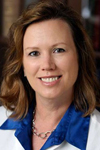 Keehbauch also was the main author
of a peer-reviewed publication: “Improving recognition of overweight
children utilizing electronic medical record generated BMI percentile for
age and sex,” Clinical Pediatrics. In addition, she had the following
peer-reviewed presentations: Keehbauch also was the main author
of a peer-reviewed publication: “Improving recognition of overweight
children utilizing electronic medical record generated BMI percentile for
age and sex,” Clinical Pediatrics. In addition, she had the following
peer-reviewed presentations:
O “Screening and Treating for Cervical
Cancer During Missions to Chiapas, Mexico,” Family Medicine Global Health
Workshop, San Diego.
O “The Impact of 2001 and 2006 ASCCP Guideline
Changes on Family Medicine Residency Colposcopy Training,” American Medical
Women’s Association, Washington, D.C.
O “Diabetes, Board Certification
Self-Assessment Modules for American Board of Family Medicine,” FAFP,
Orlando.
O “The Vitamin D Controversy,” FAFP conference, Orlando.
Clerkship faculty member Jessica Feranec, M.D., recently
made or soon will make these presentations:
O “Abdominal wall trigger
points and nerve block,” video presentation at the International Pelvic Pain
Society Annual Meeting, Las Vegas, October.
O “Prevalence of chronic
pelvic pain diagnosis among obese women compared to non-obese,” poster
presentation at the International Pelvic Pain Society Annual Meeting,
Chicago, October.
O “Outcomes in robotic versus laparoscopic benign total
hysterectomy in obese patients,” abstract to be presented at the American
Association of Gynecologic Laparoscopy Annual Meeting, Hollywood, Fla.,
November.
O “Management of complications following pelvic reconstructive
surgery with transvaginal mesh,” abstract accepted at the South Atlantic
Association of Obstetrics and Gynecology Annual Meeting, Naples, Fla.,
January 2012.
O “Preventative Analgesia: Tips for the gynecologic surgeon
to optimize pain control,” abstract submitted to the ACOG Annual Clinical
Meeting, San Diego, May 2012.
Pediatrics Clerkship Director
Joan Meek, M.D., was editor-in-chief of the American Academy of
Pediatrics’ “New Mother’s Guide to Breastfeeding: Completely Revised and
Updated Second Edition.” On the morning after the press release announced
the book’s publication, Meek was the guest expert on breastfeeding for
“Doctor Radio” on Sirius XM.
PENSACOLA REGIONAL CAMPUS
Family Medicine Clerkship Director Dennis Mayeaux, M.D.,
was quoted in a press release on the injunction ruling against the physician
gag law, which limited the ways in which physicians could ask patients about
gun ownership. The release was distributed by Florida chapters of three
national medical organizations, including the Florida Academy of Family
Physicians, in which Mayeaux chairs the board of directors. In the release,
he stated: “The impact of this law has already caused serious rifts in
physician-patient relationships. Casual conversations with patients often
bring other medical issues to light, and erosion of these opportunities also
erodes the quality of care. The preliminary injunction will now allow us to
talk to our patients again about firearm safety.”
TALLAHASSEE REGIONAL CAMPUS
Clerkship faculty member
Larry Deeb, M.D., received the Mission Model Award for the
Tallahassee campus. Campus Dean Mel Hartsfield, M.D., said Deeb “has
demonstrated leadership roles in local, national and international
organizations dedicated to the health of
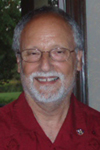 children, with special focus on
care for children with diabetes. He is actively involved with his local
civic club and leveraged that association to sponsor projects for children
with diabetes in Bolivia, Sri Lanka, Nigeria and Cameroon. He also has
received what many of us consider the highest honor of all, recognition from
his peers as the recipient of the Capital Medical Society Outstanding
Physician Award.” A sampling of comments from students: “He is extremely
knowledgeable and loves to teach.” “I learned to treat each patient as an
individual rather than a disease.” “He is someone that I would like to model
my career and family life after.” “He treats you not as a student but as a
colleague.” “He loves his job and shows it every minute you are around him.”
“He is a wonderful role model as a physician and one of our greatest assets
at FSU. Don’t ever let him go!” children, with special focus on
care for children with diabetes. He is actively involved with his local
civic club and leveraged that association to sponsor projects for children
with diabetes in Bolivia, Sri Lanka, Nigeria and Cameroon. He also has
received what many of us consider the highest honor of all, recognition from
his peers as the recipient of the Capital Medical Society Outstanding
Physician Award.” A sampling of comments from students: “He is extremely
knowledgeable and loves to teach.” “I learned to treat each patient as an
individual rather than a disease.” “He is someone that I would like to model
my career and family life after.” “He treats you not as a student but as a
colleague.” “He loves his job and shows it every minute you are around him.”
“He is a wonderful role model as a physician and one of our greatest assets
at FSU. Don’t ever let him go!”
Also honored was clerkship faculty
member Satish Mital, M.D., who received the Outstanding
Community Educator Award. Dean Hartsfield said of him: “His scholarship has
been recognized with his selection as the Stanley Russin Award for Academic
Excellence
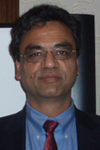 recipient while completing his residency at Hahnemann University
Hospital in Philadelphia. His commitment to teaching, his knowledge and his
willingness to encourage and mentor our students is widely recognized by
both our students and his peers.” Students had this to say: “He has
enthusiasm for teaching, a willingness to spend the extra time in discussion
with us and treats all students with respect while providing the freedom we
need to gain confidence to become more independent. He ALWAYS took the time
to explain things to me no matter how short on time we were. He gave the
most evidenced-based explanations of any physician I have yet to work with
and readily supplied me with journal articles so I could read about the
studies myself.” Another said: “He allowed me to feel comfortable making
clinical decisions – he never made me feel scared to voice my decision or
opinion.” recipient while completing his residency at Hahnemann University
Hospital in Philadelphia. His commitment to teaching, his knowledge and his
willingness to encourage and mentor our students is widely recognized by
both our students and his peers.” Students had this to say: “He has
enthusiasm for teaching, a willingness to spend the extra time in discussion
with us and treats all students with respect while providing the freedom we
need to gain confidence to become more independent. He ALWAYS took the time
to explain things to me no matter how short on time we were. He gave the
most evidenced-based explanations of any physician I have yet to work with
and readily supplied me with journal articles so I could read about the
studies myself.” Another said: “He allowed me to feel comfortable making
clinical decisions – he never made me feel scared to voice my decision or
opinion.”
FACULTY
DEVELOPMENT
Associate Dean for Faculty Development
Dennis Baker, Ph.D., was co-author of “Teacher-student
relationships in medical education: Boundary considerations,” in Medical
Teacher.
|






 Health and
Walgreens Pharmacy – included a press conference, free health screenings and
access to health information and resources. It was designed to improve the
health of racial and ethnic minority populations.
Health and
Walgreens Pharmacy – included a press conference, free health screenings and
access to health information and resources. It was designed to improve the
health of racial and ethnic minority populations. Assistant Professor
Kim Driscoll,
Ph.D., was author or co-author of the following articles either published or
in process:
Assistant Professor
Kim Driscoll,
Ph.D., was author or co-author of the following articles either published or
in process: O “Targeted Research on
Mental Health Disparities,” an R01 grant from the National Institute of
Mental Health; she is principal investigator. The aim is to examine
disparities in depression and treatment use from pregnancy through
postpartum across national sites, including the University of Iowa, Emory
University, University of Cincinnati, University of Washington, and Brown
University.
O “Targeted Research on
Mental Health Disparities,” an R01 grant from the National Institute of
Mental Health; she is principal investigator. The aim is to examine
disparities in depression and treatment use from pregnancy through
postpartum across national sites, including the University of Iowa, Emory
University, University of Cincinnati, University of Washington, and Brown
University.  Clerkship faculty member
Thomas A. Lacy, M.D., has been working with
Clerkship faculty member
Thomas A. Lacy, M.D., has been working with
 Keehbauch also was the main author
of a peer-reviewed publication: “Improving recognition of overweight
children utilizing electronic medical record generated BMI percentile for
age and sex,” Clinical Pediatrics. In addition, she had the following
peer-reviewed presentations:
Keehbauch also was the main author
of a peer-reviewed publication: “Improving recognition of overweight
children utilizing electronic medical record generated BMI percentile for
age and sex,” Clinical Pediatrics. In addition, she had the following
peer-reviewed presentations: 